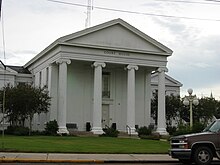Saint Martin Parish, Louisiana
| Saint Martin Parish, Louisiana | |
|---|---|

St. Martin Parish Courthouse, St. Martinville
|
|
 Location in the U.S. state of Louisiana |
|
 Louisiana's location in the U.S. |
|
| Founded | 1807 |
| Named for | St. Martin |
| Seat | St. Martinville |
| Largest city | Breaux Bridge |
| Area | |
| • Total | 816 sq mi (2,113 km2) |
| • Land | 738 sq mi (1,911 km2) |
| • Water | 79 sq mi (205 km2), 9.7% |
| Population (est.) | |
| • (2015) | 53,835 |
| • Density | 71/sq mi (27/km²) |
| Congressional district | 3rd |
| Time zone | Central: UTC-6/-5 |
| Website | www |
St. Martin Parish (French: Paroisse de Saint-Martin) is a parish located in the U.S. state of Louisiana. As of the 2010 census, the population was 52,160. The parish seat is St. Martinville. The parish was founded in 1811.
St. Martin Parish is part of the Lafayette, Louisiana Metropolitan Statistical Area. 27% of the population of St. Martin Parish have French fluency, rated as one of the highest concentrations of French speakers in the nation.
In 1811, the division of Attakapas Parish created St. Martin Parish and St. Mary Parish. In 1824, St. Martin Parish was divided, resulting in the creation of Lafayette Parish. In 1844, St. Martin Parish was again divided, creating Vermilion Parish. In 1868, Iberia Parish was formed from parts of St. Martin Parish and St. Mary Parish, literally dividing St. Martin Parish in two, as part of Iberia Parish runs between the two non-contiguous parts of St. Martin Parish.
St. Martin Parish was largely colonized by people from France and Acadia in the 1700s, accounting for the large concentration of French-speaking population today. The Acadians brought with them the tale of Evangeline, a young woman who was separated from her supposedly-mortally-wounded betrothed during the Expulsion of the Acadians. According to the tale, Evangeline later met her betrothed in St. Martin Parish, but he had moved on to a new love and she never recovered from the shock of both finding him and losing him again. Henry Wadsworth Longfellow's most famous work, Evangeline, A Tale of Acadie, was based on this story. Evangeline was and remains an icon of Acadian and American culture. The historical Evangeline, who is believed by some to have been an orphan girl named Emmeline Labiche, is supposed to have been buried on the grounds of the St. Martin de Tours Catholic Church in St. Martinville.
...
Wikipedia
